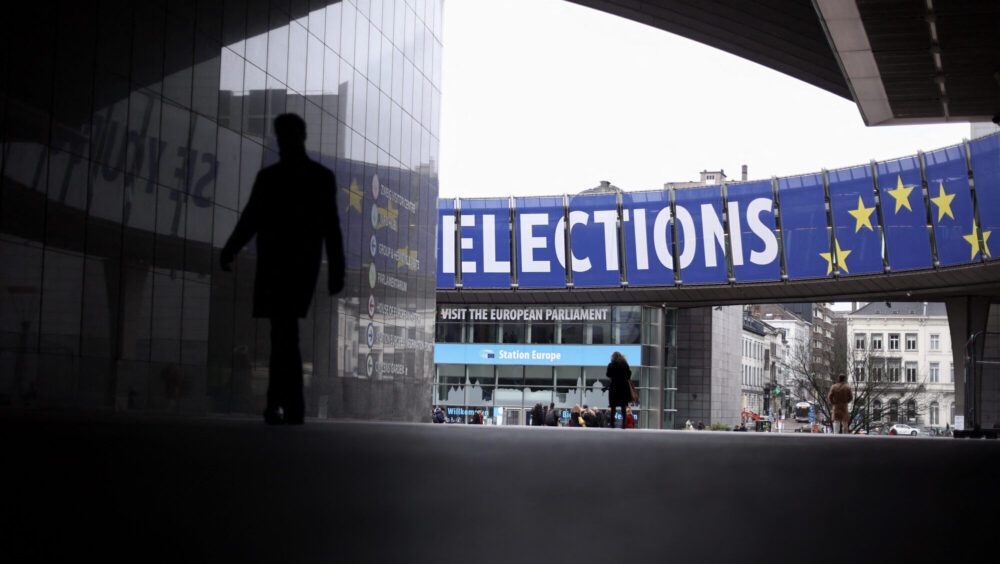
Advertising the EU Elections at the European Parliament’s Brussels headquarters, February 2024
Kenzo Tribouillard / AFP
The European Commission gave €132.8 million of taxpayer funds to media outlets through an opaque funding mechanism ahead of last year’s EU elections. The existence of this contract was revealed by the Spanish human rights advocacy Iustitia Europa, which is taking the EU to court over the still-classified documents to learn the identity of the beneficiaries.
The payment was transferred through an “indirect” funding mechanism whereby the EU signs a “framework contract” with a private intermediary, who will then disburse the funds to media organizations in total silence.
This allows for bypassing EU transparency rules that would otherwise require the Commission to register every payment over €14,000 in its publicly available, although deliberately murky, tenders database.
🚨EXCLUSIVA: La UE transfirió € 132,82 millones € a medios de comunicación antes de las elecciones europeas del 2024. Iustitia Europa presenta acciones judiciales contra la UE. Alvise Pérez, levántate y trabaja. Te votaron para eso. Dentro Hilo👇👇 pic.twitter.com/sZN2alswNv
— IUSTITIA EUROPA (@IustitiaEuropa) February 11, 2025
In this case, the intermediary was the Havas Media Group, the media division of the global marketing and communications advisory firm Havas, present in over a hundred countries, including most, if not all, EU member states. Havas belongs to the Vivendi group, a private advertising network that owns several major outlets and TV stations in Europe.
According to the framework contract identified by the Iustitia Europa as ‘Comm/Dg/Fmw/2023/30,’ Havas Media France was given €132.82 million by the EU Commission’s directorate-general for communication on October 5th, 2023, right as the campaign period for the 2024 EU election was kicking in.
Havas then presumably disbursed these funds among its network of clients, which includes many of the biggest media outlets and TV channels around Europe. Using the private company allowed the Commission to avoid any questions of potential conflicts of interest. As Iustitia Europa explained:
The advantage? Avoiding public disclosure of individual payments and beneficiaries. This indirect financing mechanism could be used to circumvent transparency controls and hide the final destination of the money.
These payments might have officially been issued to buy advertising space, but the advocacy believes it served the purpose of getting media outlets around Europe “to publish content favorable to the EU”—similarly to Politico’s taxpayer-subsidized ‘pro’ subscriptions—otherwise, it would not have to be hidden.
Following these revelations, the Italian daily Il Fatto Quotidiano inquired about the giant tender at EU Commission President Ursula von der Leyen and Parliament President Roberta Metsola, who replied through their respective spokesmen that it concerned “advertising services” but the exact recipients and the amounts they received from Havas is classified information due to the nature of the framework contract and the private intermediary used.
Metsola’s office added that it’s possible to request further details through an official freedom of information request under Article 15 of the TFEU. However, that rarely works as intended in Brussels, as the Commission has been reprimanded countless times by the EU Ombudsman for being months late or never even answering FOI requests.
Even if the Commission were to release more documents, most relevant information would probably remain retracted. As von der Leyen’s office told the newspaper, the framework contract requires that both Havas and the EU “ensure that the dissemination of any information does not compromise the commercial interests of economic actors.”
Talking to europeanconservative.com, Luis María Pardo, the founder and CEO of Iustitia Europa, explained that they are actively pursuing this investigation anyway, and are prepared to take the Commission to court if it continues to refuse disclosure:
We have asked the EC and EP for access to the full budget line for transparency. There are two options: they either answer or don’t. If they don’t answer, we appeal to the General Court of the European Union. If they do answer, we analyze the documents, and if we see something, we go directly to the European Public Prosecutor’s Office.
